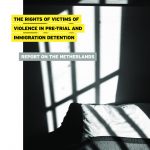New policy guidance and bill of rights on the rights of victims of violence in pre-trial and immigration detention in the Netherlands
The Netherlands has adopted a strong framework on victims’ rights within its domestic criminal system: victims have to be informed of their rights in criminal proceedings at an early stage, including their right to participate in proceedings and to obtain legal representation, and to seek compensation. Yet the way in which these rights are implemented for victim detainees is inadequate, a new report published by REDRESS in October found.
Our report explored the effectiveness of the current legal system in the Netherlands in ensuring the rights of victims of violence in pre-trial and immigration detention.

Following the publication of this report, REDRESS published a Policy Guidance Note on the rights of victims of crimes in pre-trial and immigration detention in the Netherlands (read it in Dutch here). Drawing from the report, from international and European standards identified by the project’s consortium of NGOs, cases, reports by international committees, and consultations with key stakeholders in the field, the Policy Guidance Note addresses policy recommendations to relevant authorities in the Netherlands.
REDRESS has also produced posters in English and Dutch to inform victims of violence in pre-trial and immigration detention of their rights. If you wish to download these posters, please click on the links below:
- Bill of rights for victims in pre-trial detention: English and Dutch
- Bill of rights for victims in immigration detention: English and Dutch

More about the report
Over a period of six months, REDRESS interviewed key stakeholders in relation to pre-trial and immigration detention, including ministerial authorities, National Preventative Mechanism representatives, NGOs, lawyers, prosecutors and former detainees. They were interviewed on how victims of violence in pre-trial and immigration detention access their rights as victims in practice in the Netherlands, both through the complaint mechanism specific to detained persons, and through the regular penal system. REDRESS also extensively reviewed reports by NGOs, academics and the NPM, legal texts, and decisions in the Netherlands, and the reports of international and regional anti-torture bodies.
One of the findings of the report highlights concerns over the wide discretion of the directors of detention centres to restrict the rights of victim detainees and impose disciplinary measures, including solitary confinement. This is due to the lack of specific laws governing the rights of victim detainees.
The report also finds that the right to information is not sufficiently implemented in relation to victim detainees. Often, victim detainees only receive information about their rights from their defense or immigration lawyer. There is no clear point of information on victims’ rights in detention centres.
Moreover, the report finds that the remedies that are available to victim detainees, whether in the regular criminal system, complaint mechanisms specific to detention centres, or disciplinary claims against detention staff who have committed violent crimes against detainees, do not adequately protect the rights of victims detainees. For example, the report finds that complaint mechanisms specific to detention centres are insufficient to adequately address allegations of ill-treatment by staff, and there is concern over the lack of transparency in disciplinary procedures. The report shows that there is a tendency to relocate detention staff against whom detainees have filed serious complaints rather than initiate investigations and eventual prosecutions against them.
Finally, the report highlights the fact that the Dutch National Preventative Mechanism is not currently in a position to operate in the most effective way, due to a lack of cooperation between supervisory bodies. International and regional anti-torture bodies, as well as other NGOS, have also criticised the absence of a clear mandate as well as its lack of independence.
REDRESS makes several recommendations including the following:
- Detainees should be informed of their rights, and the rules and complaint mechanisms specific to the detention centre, upon arrival and periodically throughout their detention;
- A permanent focal point for victims should be established in all detention centres. Alternatively, the existing victim support institutions (Slachtofferhulp) should be provided with the resources necessary to offer such services in detention centres;
- Specific training on victims’ rights in the context of detention should be given to all detention staff;
- Individual needs assessments should be carried out for all detainees, including asylum-seekers and undocumented migrant detainees, from the outset of their detention and regularly during such detention. In this regard, trauma training should be given to detention staff so they can identify vulnerable persons;
- Authorities should ensure that asylum-seekers and undocumented migrants in detention have access to independent and effective complaints mechanisms for addressing complaints of alleged torture and ill-treatment;
- Clear communication channels should be established between the complaints’ committees and the national prosecution services in cases of serious allegations;
- Disciplinary rules and mechanisms against detention staff should be made more transparent;
- Clear criteria should be established by law for access of NGOs to detention centres;
- Compensation for violent crimes in detention should adequately reflect the gravity of the crime and suffering of the victim detainees;
- Desegregated data on any reparation measures ordered by criminal courts to victims of violent crime in detention should be published;
- A clear mandate and structure should be provided to the National Preventative Mechanism to ensure its efficiency and independence.
All these materials have been produced as part of a wider European Union-funded project, Victims of Violent Crimes in Detention. The project aims at improving access to justice for victims of violent crimes suffered in pre-trial and immigration detention by ensuring full compliance with relevant EU directives. The project covers six European Union countries (the Netherlands, Belgium, Croatia, Hungary, Italy and Sweden).
The project is conducted in partnership with Fair Trials Europe, the Centre for Peace Studies, the Hungarian Helsinki Committee, Antigone, and Civil Rights Defenders.
